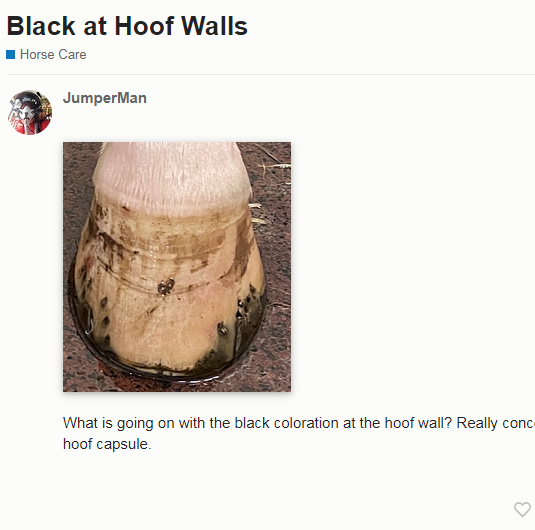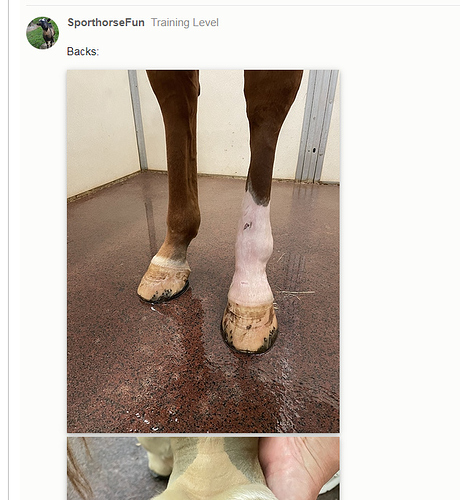I say time for a new vet and new farrier, pronto. I have no idea where you are, but can you haul to a university vet clinic if need be? IME, any vet worth their salt is going to listen to you and do nerve blocks!
Picking thru what you’ve said, yes absolutely low/negative angles are going to cause/exacerbate problems. No question about it. Because of the changes the new farrier made I’d be suspicious this horses soundness issues have been reaggravated and possibly made worse. If he were mine I’d be taking him home and doing nothing until I found competent vet/farrier care.
Note also that jumperman and sporthorsefun often post in the same threads. About the same topics. Including the lameness locator. Edit: and one thread about a new trailer that needs a camera, and less than a week later the other one posts a thread asking about trailer cameras.
Strange that here they would pretend not to know one another… at least don’t make it so blazingly obvious.
Edit final: Proof that they’re either the same person or know one another is in another post below. Why, outside of desperation, would someone need or want an alter, I will never know.
I think so too. I have two schools in mind with really good large animal hospitals and an expertise in lameness. I finally have the farrier piece, which makes it sad that he lost the supportive shoe and got worked. I don’t know if they forgot he had no shoe on that leg or what happened. But goodness, three days of work, and heavy work. Then he didn’t want to carry himself anymore. I just feel for this horse. Time to reset, as you have suggested. Thank you so much.
Finally, after reading through all the past threads re: this horse -
Retire him. You’ve put him through enough. At this point it’s about you, not him. He needs a grassy field with some friends, with no more poking and prodding. You tried everything, you tried your best. He’s broken. Sometimes you can’t fix that. Let him just be a horse.
I’d recommend you stop trusting professionals with this horse. Be at every single appointment and ask questions/repeat history until you are satisfied with the plan/proposed diagnostic/proposed treatment. Horses aren’t belligerent out of the blue or for fun. They have a reason. This horse has been through a lot, and if you aren’t ready to retire him you’ll need to be really on top of how he’s feeling every single day.
It’s a lot easier to keep a story straight when you’re telling the truth.
This thread started by “JumperMan”:
Using a cropped photo from this post by “Sporthorsefun”:
And earlier in this thread where they pretend not to know each other (or be the same person):
Was fibrotic myopathy ever discussed?
How did the UFP diagnosis arise from slipping?
what did this riding consist of?
ridden and sound, or pasture and sound?
very common
who gave that diagnosis?
That “rehab” place sounds horrible
If you don’t know where to pinpoint things, you can’t just go in and do ALL the diagnostic work, especially since many things you find as 'wrong" may be symptoms, not causes. But I still have questions on all the diagnoses
sent to whom?
Any competent general vet should be able to do nerve blocking.
they bother all horses, some just don’t tolerate it as well as others, which means those others may allow things to get to a bad enough point that they “suddenly” explode and become angry, all the while the owner/rider/trainer has missed every little warning signal along the way
What does “cuts the hooves down” really mean? If feet were long to begin with, getting them properly short can look terrifyingly short to someone who hasn’t seen properly short feet.
did you ask for blocking? Did you ask why they felt it wasn’t necessary?
Because not all vets are good? Because the bottom of the class still gets their DVM? Because some vets suck as lameness situations? You seem to want All The Things done right from the start, but that’s a very, very hard way to approach things.
Were you offered more diagnostics?
Did you ASK for more diagnostics?
What other diagnostics do you feel should have been done right from the start?
Did you get your horse’s records sent to the new vet(s)?
I don’t believe horses go from willing to belligerent for no reason. I owned one where this type of behavior was his go-to response. Had one vet who knew horse very well (and witnessed this behavior as well as witnessed behavior resolve when pain issue was addressed) tell me at one point to just send horse to a cowboy because vet got to a point where they couldn’t find the problem. I fired that vet.
My vet nerve blocked my mare last summer after the Lameness Evaluator found an anomaly on one front hoof. It was fixed by a trim, NBD. Just saying, regular vets nerve block if they think it’s useful.
Outside of the in-thread commentary, OP, if this is a legitimate situation of yours I would truly stop trusting professionals and bring your horse to a clinic yesterday.
I had so many questions from your OP – JB touched on some of them, but others … like… what was the rehab protocol like bringing your horse back the last 3 years?
Why were trailers put on a horse with torn cartilage in their stifle?! 
What kind of “shoeing support” for the suspensory?
Are there x-rays available pre-“hoof chop” from the new farrier?
What kind of behaviors are being demonstrated by this horse at the rehab facility, and why are they doing work that requires whipping? Assuming speed…?
Six weeks is not enough time, IMHO, to be doing any sort of work outside of walking or trotting in straight lines, for a horse with stifle issues and old suspensories.
I have a lot of questions. I’m sure you do too. I’d ignore the “bridle lameness” diagnostic and go to the clinic - IME those horses are still actively lame, they just can’t disguise it as well undersaddle with the added weight of a rider.
Your situation – and past threads about your situation - raise so many red flags for me that I think it’s time for you to be your own advocate, be there at every appointment, write down everything as it is said, have the vet SEND you a written post-vet evaluation/diagnostic work up, and find a better network of professionals.
In no world does your world sound normal.
Some horses will never be sound, no matter how much money you spend. I’ve found it best to simply retire the horse once they reach that point. You can spend thousands and never get a sound horse.
My friend has this cheap little Paso Fino pony that was a rescue. The pony is not appealing to look at in any way. She has the narrowest face, shark fin withers, a roached back, and not very straight legs. Very weedy looking. In the many years we have been friends I have never seen that little horse take a lame step. Then you can have a beautiful horse with spectacular breeding that has all sorts of lameness issues. My other friend used to breed warmbloods and she struggled with keeping them sound, although I suspect some of the issues were environmental (very waterlogged property).
Pssm type 2 can present like lameness issues - so can a bunch of other problems. I think a university vet school is a good starting point. X rays change over time so you probably need to do nerve blocks all the way up, and x ray anything that looks like it might be problematic. If that fails to find anything you could use nuclear scintography. I would probably do a muscle biopsy to test for pssm 2 and check muscle enzyme levels. Ultrasound or MRI if you suspect soft tissue injuries.
I don’t have that kind of money to spend so I simply retire or semi-retire my horses if they start having issues.
I had one horse who was later diagnosed with DSLD. Looking back, she was never very sound and that certainly explains why. She originally was treated for navicular syndrome and hock arthritis. No amount of money on diagnostics or treatment would have given me a sound horse.
Your horse may need a lighter workload and perhaps different human handlers. Some people are content with an hour of walking their horse under saddle.
whoaaa this is a wild ride 
I agree with others, whatever is going on, if after these many years and your medical interventions, it may be retirement is what’s best. I’m sorry you’re going through this, it’s obviously really frustrating!
OK, so here goes. You know, when I post these questions, it is really hard to be politically correct, to not impune anyone’s reputation, and yet not really understand what is happening. However, it is time to just say it, the vet rehab hospital did not do a good job. They didn’t, but I couldn’t say to them, “What were you thinking that it is OK to work a horse hard without a therapeutic shoe on a previously injured leg?” because it says to them I think they are incompetent, and I just didn’t want to deal with that in this small tight knit community, so I took him out. It was absolutely sickening to see that I brought home to my old barn a limping horse from rehab, and they were whipping him the last week to make him go. You guys can understand why that is something you try to give the benefit of the doubt for. And it’s painful. I am so glad we stopped the work immediately. He was seen yesterday by a new vet, and he does have a mild suspensory injury, so I was not “overthinking” this gait anomaly and trying to put the pieces together that he might be in pain. The barn trainer where I was rode him to provide a second opinion decided he was sound too. That is when I posted to COTH and attached the video which I took down after a poster went off on a tangent. It’s even harder when a vet professional is saying he is “bridle lame”, and that doesn’t make any sense because there has not been any move to exclude any, like zero, possible causes of lameness (and then you have this whole history, so it is not like anyone is starting from scratch). It is mind boggling. So, when a vet says bridle lameness, COTHer’s, I wanted to undersand in what ways “bridle lameness” gets used as a diagnosis that I didn’t know about. I also wanted to know why I have such a hard time getting vets, outside of a surgeon, to do nerve blocks. I thought this was a resonable question, and maybe nerve blocking was an art form as I was told injecting a stifle was a skill not everyone had.
After my initial post, and the snarkiness the ensued, I questioned why I was doing this to my horse and myself after all we had been through. I guess it is because I care about the quality of life for this animal, have hopes that we can makes something of ourselves and maybe be a credit to the sport. Before he was seen yesterday, I decided that if indeed he has an injury, for his pasture comfort, I would do what I could to help it heal. Before we saw the new vet yesterday, I did call a lovely retirement barn where I know the owner, because quite frankly I am thinking about what has been said regarding retiring the horse in the best interests of him and myself.
I have since moved him to an eventing barn where the resident trainer is well versed in soft tissue injuries, actually agree on how to condition the horse, watch for the horse being overfaced and will think about why, the arena has good footing, the turnout is appropriate, and the new vet is working closely with us. I have a journeyman farrier who also understands what he is doing and is willing to come to the new barn. This horse will tell us how how he feels, and I am going to let him make the call. He is an honest horse, an incredible mover, and he deserves a great retirement if he that is where his body and mind are at. Thank you, everyone who took time to think about this and see how they could help. It means so much to me, and this is why I continue to love the sport and embrace the priviledge of owning a horse.
Beowulf, I replied to you. I just got in my head, and the reply was for the whole thread. You ask great questions and have great insight.
Sorry your poor horse had to go through that. Best of luck with getting him sound.
I would not let the rehab place you sent him to get away with what they did. If you can help another horse and owner from possibly experiencing what you did, I would make known what happened in your situation.
I would also question them face to face as to why they did what they did. It doesn’t have to be ugly but as a paying customer you deserve an answer.
The rehab hospital sounds not just incompetent, but dangerous. It sounds like you now have a good plan, and hopefully some more knowledgeable professionals to work with. Best of luck with getting your horse feeling better.
Thank you! 
Pm’d you.
I have never heard the term bridle lame. I know coaches who call a horse rein lame. This refers to bad riding causing a horse to move short or unevenly.
My vet does lameness evaluatiins on hand and longe so riding doesn’t impact.
Evaluating your care team and service providers is a huge part of successful horse care. Unfortunately it can be difficult when you are faced with a new issue. Also a good chunk of standard vet, farrier and feed advice can be counterproductive and as far as body workers, trainers, rehab, pulse devices etc it’s basically the wild west out there.
My experience is that you (g) need to be self educated, hands on, proactive, advocate for your horse and have a good bs filter in order to get good outcomes on health issues.



